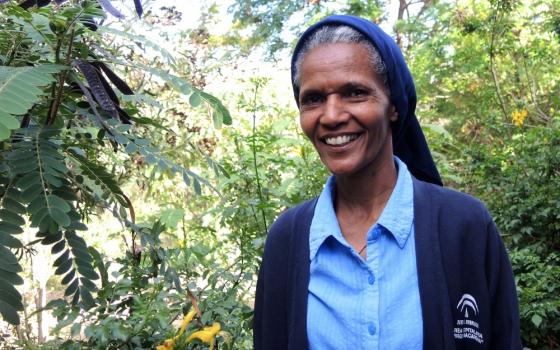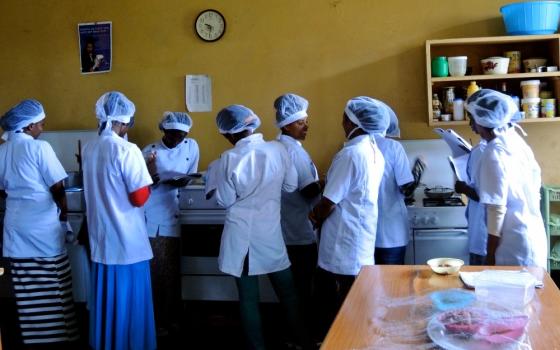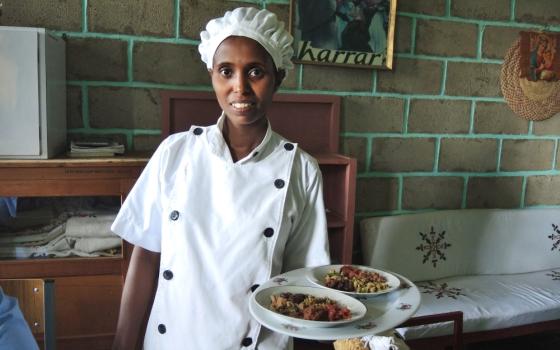The smell of tibs and kitfo spiced with the special berere spicy-pepper mixture wafts out of the kitchen at the St. Louise Women's Empowerment Project in Mekele. About 30 girls are finishing up the day's practicum in the regional capital of the northern district of Ethiopia, cooking four different traditional Ethiopian meat dishes like tibs and kitfo, which are served on injera, a flat bread made of fermented teff, Ethiopian wheat.
Daughters of Charity Sr. Abeba Hadgu, 50, looks on with pride at the food-preparation class. Since 1992, more than 2,000 young women have graduated from the congregation's six-month women's empowerment program in food preparation or sewing. Even the current teacher, Bedla Solomon, is a successful product of the empowerment course. She graduated from the food-preparation program six years ago, gained experience working for the Filippini Sisters in the nearby town of Adigrat, and returned to teach this class.
Global Sisters Report caught up with Hadgu to learn more about empowering women through work.
GSR: Tell me a little about the program.
Hadgu: We started a sewing program after the war in 1992 [the overthrow of the Derg military regime, which lasted from 1974 to 1991]. The cooking program started in 1999. Every year, we have about 100 graduates from the cooking and sewing courses.
I came to run this program in 2007. Before this, I did youth leadership, and I'm trained as a social worker. I was trained in a method called DELTA: Development Educational Leadership Training in Action. The main aspect of this is that you don't help people; you help people help themselves.
Tuition for our empowerment program is 300 birr (U.S. $15) per month for six months, but we try to get donors for the very poor students so it can be free for them. We work with the local government administration — they select needy ones for our program. We used to have a radio program that advertised our program, but now most people know our work is here because we've been around for so long. We have 17 lay staff members plus me, the project coordinator.
What kind of women come to this program?
The women we work with are mostly mothers with kids, and they may have kids from different fathers, so they live alone and they don't have enough to live on. When their child is sick, they have to miss class to take them to the clinic. They need money and housing. There are so many problems, and you can't answer all the problems. Sometimes after the program, you see them doing so well because they are very bright, but then something happens that is out of their control and their business just collapses. It is very challenging.
How do the women help themselves?
When each group graduates, we invite those in jobs to talk about the changes in their life. Before, they were dependent on someone else; now, they have their own money. Some are upgrading and going to night school. We had a young woman being trained in sewing, and she opened her own shop and then she employed three of our graduates. That was very encouraging. They build friendships like that.
Do you have advice for other sisters running women's empowerment programs?
It depends so much on the area and what people need. I've learned that you must go to the people and really understand their needs. If you do that, people can change.
You can be overwhelmed by the needs. But if you take time to listen to them and know what they can do, you can really help them.
But what we're doing here may not work in another place. The food-preparation training is successful in Mekele because so many hotels are being built over here. The international hotels are for tourists going to Danakil [a nearby active volcano] or the stone monasteries of Tigray. There are also big meetings here because it's a regional capital. There are three- and four-star hotels preparing to be five-star hotels.
But in another place, like a village, the cooking program wouldn't be the right thing because there would be no work, so people would get discouraged.
We do a study every three years to understand what is really needed at the hotels. What do hotels really want from their future employees? This includes things like recipes and customer service. We also have a model bed here [to practice making a bed] because many of the students come from homes where they don't have beds. They may sleep on a mattress on the floor. But if they work in a hotel, they need to know how to make a bed.
What are your future plans?
The government wants to develop this project so that it will be for longer, like a year instead of six months. But the educational background of these people is so poor, and they are from such a poor background, that we are fighting with the government not to do this. A yearlong program would be expensive, and also, we would reach fewer students.
Right now, our funding comes from Misserior and Caritas, and also an Italian organization connected to the Salesians of Don Bosco. We are looking for ways to be self-sustainable, but it's difficult. If we were totally self-sustainable, we would have to stick to only those students who can pay, but that wouldn't help the poor. Now we are thinking of building an event hall to rent out for profit, but that will take at least three years.
What makes your program successful for the graduates?
I think for us, the success is the commitment of the staff and the sisters. We really want to help people to change, and they can change. Sometimes, we have people who are discouraged. They don't believe that they can change, but they can. What we do here is being beside the poor. When we are beside them, we can help them uplift themselves.
[Melanie Lidman is Middle East and Africa correspondent for Global Sisters Report and based in Israel.]




